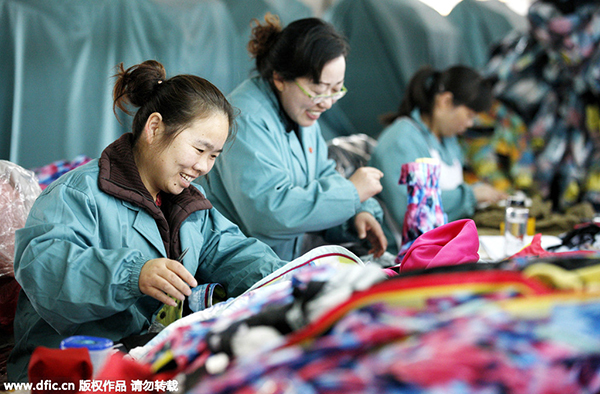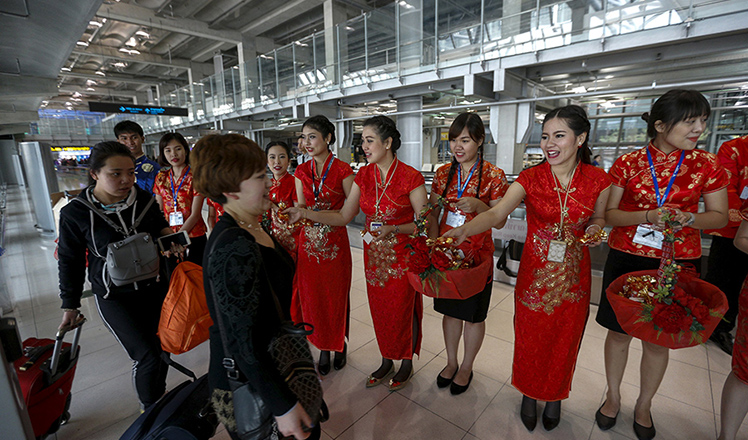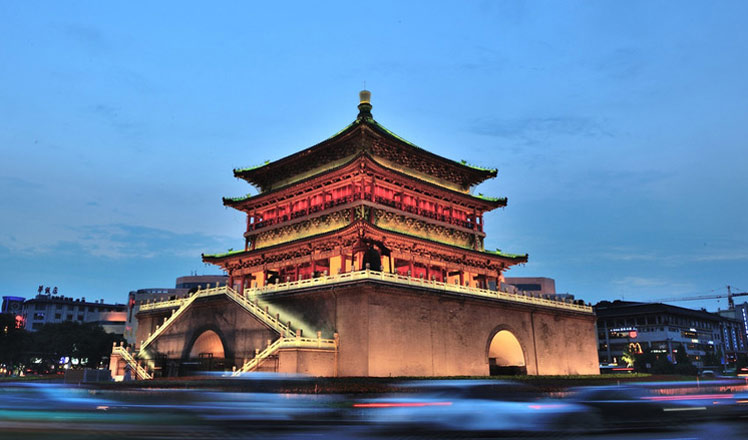Who roots for China's "collapse"?
Updated: 2016-02-17 14:21
By Robert Lawrence Kuhn(chinadaily.com.cn)
|
||||||||
 |
|
Workers manufacture garment that will be exported to the European Union in Huaibei city, Anhui province, Dec 8, 2015. [Photo/IC] |
"China is taking over the world" was a casual remark by an American blue-collar worker, said in a resigned sort of way.
 |
| Robert Lawrence Kuhn |
"I know something about China," I replied, "and China has serious problems." "That's good," he said. "That's not good," I responded. "Do you want to pay higher prices for lower quality goods?"
I described how the well-being of Americans is linked to China. Either we succeed together, increasing our mutual standards of living, or we suffer together. I can't say I made a convert but I think I undermined a stereotype.
I recalled the conversation when musing about the rash of the "China Collapse" speculations of late and why this cyclical and long-debunked claim has credence.
I analyze the "China Collapse" theory in three parts: What is the argument? Who are its advocates? Why does it resonate? I explain why the theory is either misconceived or underdetermined, and at best (worst?) categorized incorrectly, evolving issues under a simplistic, inflammatory title.
The "China Collapse" argument is that China's economy is facing a constellation of severe, debilitating forces: slowing growth, market volatilities, social imbalances, industrial overcapacity, excessive debt, rising wages, reduced competitiveness, overbuilt housing, unproductive infrastructure, massive pollution, insufficient state-owned enterprise reform—the list is not short.
These issues are real. Each one of the issues are the natural result of unprecedented economic development in a compressed period of time. But what follows? Each issue is being addressed, imperfectly of course, but in a coordinated manner. China's focus on innovation, entrepreneurship, science and technology, Made in China 2025,residency reforms to help migrant workers, and the like, are all part of China's 13th Five-Year Plan (2016-2020).When mistakes are made, such as tight circuit breakers on stock market volatility that fueled rather than doused anxiety, they are corrected rapidly.
What does "collapse" mean? In mid-2015, China's stock market "collapsed", as it were, but stability was restored (hopefully with lessons learned), and obviously the stock market continues on. Economics run in cycles, boom and bust, with peaks and troughs higher or lower. So those who predict "collapse", loosely defined, must be "correct" at some points in the cycle (much like a clock that has stopped working must be "correct" twice a day).
- Chinese military sets up corruption hotline
- Foreigners working in Beijing can now buy apartments immediately
- Thousand-year-old temple seeks new media talents
- First train from China to Iran stimulates Silk Road revival
- Big data for Spring Festival: 8m overseas trips, etc
- Winter swim enthusiasts celebrate the Year of the Monkey
- 'Grim Sleeper' murder trial begins six years after arrest
- Cameron defends EU deal as lawmakers offer no guarantees
- Sarkozy placed under investigation in campaign funding probe
- Moscow dismisses accusation of Russia bombing Syrian hospitals
- 2016 Westminster Kennel Club Dog Show held in New York
- Pakistan confirms participation in Saudi-led military drills

 Excitement, charm and grace: Chinese New Year in UK
Excitement, charm and grace: Chinese New Year in UK
 Taylor Swift wins Album of the Year at Grammys
Taylor Swift wins Album of the Year at Grammys
 Stars spotted at film academy exam in China
Stars spotted at film academy exam in China
 Record number of Chinese travel abroad for Spring Festival
Record number of Chinese travel abroad for Spring Festival
 Future bodyguards undergo brutal training in Beijing
Future bodyguards undergo brutal training in Beijing
 Chinese Lunar New Year marked in central London
Chinese Lunar New Year marked in central London
 Top 10 most difficult cities in China to get a taxi
Top 10 most difficult cities in China to get a taxi
 Sichuan opera charms British children
Sichuan opera charms British children
Most Viewed
Editor's Picks

|

|

|

|

|

|
Today's Top News
Will US-ASEAN meeting be good for region?
Accentuate the positive in Sino-US relations
Dangerous games on peninsula will have no winner
National Art Museum showing 400 puppets in new exhibition
Finest Chinese porcelains expected to fetch over $28 million
Monkey portraits by Chinese ink painting masters
Beijing's movie fans in for new experience
Obama to deliver final State of the Union speech
US Weekly

|

|








